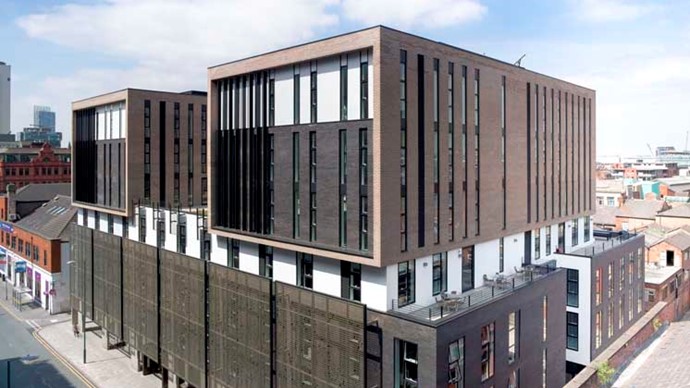Smart Cities and Communities: Achieving Smart Urban Growth
- 22 March 2017
- 08:30 - 16:30
- The Studio, Manchester
Our cities and communities are changing at an unprecedented pace and scale. The UK Department for International Trade reported that by 2050 the number of people living in urban environments will have grown to around 7 billion. Alongside increased pressures on housing and transport there are strains on health services further compounded by complexities relating to public health and ageing populations. Local areas need to find smarter ways to support the complex needs of their people and develop the infrastructure to overcome some of the grand societal challenges. Making a city smart is not just about technology and connectivity. People are key and are the lifeblood of any city or community. Digital innovation opens up vast potential for new types of interaction with our citizens, with physical spaces and systems becoming part of a connected conversation. Policy makers from the leading smart places around the world are engaging directly with their communities to understand and improve their lives.
At Smart Cities and Communities: Achieving Smart Urban Growth you will have the opportunity to learn how International city projects are using frontier technology to tackle some of the biggest problems and use existing resources smarter. We will explore perceptions, experiences and ideas on what makes a city smart, and how we can sustain our places and communities to thrive for generations to come.
UK Governments is working in making urbanisation manageable and, most importantly, sustainable for the future. With smart technologies being essential to achieving this, the UK has taken a number of positive steps to help position itself as a leader in the provision of innovative solutions in Europe.
The role Connected and Autonomous Vehicles can play in delivering more productive, sustainable and resilient cities.
This audience-engaging presentation will demystify the idea of a “smart city’ by discussing how a comprehensive plan starting with a clear understanding of the desired end-game user experience can turn a city’s biggest challenges into opportunities.
Virtual Singapore is a collaborative platform with a rich data environment and visualization techniques that will be used by Singapore’s citizens, businesses, government and research community to develop tools and services that address the emerging and complex challenges Singapore faces. This project will build upon Dassault Systèmes’ 3DEXPERIENCity to create a dynamic, 3D digital model of Singapore and connect all stakeholders in a secured and controlled environment. The model will employ data analytics and simulate modelling capabilities for testing concepts and services, planning, decision-making, researching technologies and generating community collaboration.
Amsterdam has been awarded the European Capital of Innovation, or iCapital, for 2016, during a ceremony hosted by the European Committee of the Regions. The Commission awarded the European city that is building the best ‘innovation ecosystem’–connecting citizens, public organisations, academia, and businesses.
The way cities work is changing. Using digital technologies, Bristol Is Open, a joint venture between University of Bristol and Bristol City Council is creating an open programmable city that gives citizens more ways to participate-in and contribute-to the way their city works.
Digital mapping and spatial analytics have a vital role in delivering smart communities that are Safe, Liveable, Prosperous, Healthy and Well run. These capabilities enable people, place and technology to come together through the Internet of Things to deliver empowerment of citizens and stakeholder engagement, while creating efficiencies for government and the wider community. The session will explore these themes, demonstrating why it is SMART to know WHERE when planning for and delivering a smarter future.
After decades of technical inertia, lighting is now changing rapidly in both its purpose and application. In this presentation we look at this change and how the lighting of the future will form a critical element in smart city design.
Intel Labs Europe, University College London, Imperial College London and Future Cities catapult are working in partnership for the creation of an Urban Internet of Things Demonstrator in the Queen Elizabeth Olympic Park. This project aims to show the possibility of the Internet of Things solutions to solve urban challenges, including improving the health and wellbeing of city residents, both human and non-human.
CityVerve, the UK’s IoT cities demonstrator, aims to create a smart, innovative, inspiring Manchester – a blueprint for smarter cities worldwide. We are applying IoT technology in energy, air quality and health to help improve the lives of citizens as well as exploring the cross-thematic insights that can be gathered from the data we collect.
The smart city vision often fails to recognise the role that behaviour and culture play in the way cities work. CityVerve is the UK’s demonstrator for Internet of Things (IoT) and smart cities that aims to build and deliver a smarter, more connected Manchester though human centred design, citizen engagement, and culture and public realm.
Entrepreneurs and start-ups in Greater Manchester are thriving in an increasingly sophisticated and supportive innovation ecosystem. Through central government’s devolution agenda, city regions will soon have the powers to better respond to these opportunities and challenges, based on local needs and ambitions.

Situated in the heart of Manchester's iconic Northern Quarter and just a couple of minutes walk away from the city's major transport links; The Studio is a spacious, contemporary meeting centre atop The Hive building on Lever St.
Whatever the legendary Manchester weather has to throw at you, you’ll always find the warmest of welcomes at The Studio.